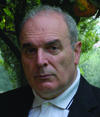Often we hear assertions by the media (and others) that they know what a person is thinking, or better, what he'll do next and why. This is certainly true when talking about the pope: Vatican watchers (speculators?) think they have the pope pinpointed. Much of what is said in the media is a string of partial understandings: one would hope that we could just say we are making a prediction so when it doesn't materialize we don't run away with our heads hung low. Of course human nature seems to want to be right all the time to garner power, fame and even money. Intrigue is rather boring 99% of the time. That said, there are a few people who modestly have an understanding of Benedict XVI which we ought to note.
 The longtime friend and collaborator of Msgr. Luigi Giussani, Msgr. Massimo Camisasca, also the founder of the Priestly Fraternity Missionaries of Saint Charles Borromeo, wrote an OP-Ed piece, "The Method Of Benedict XVI
The longtime friend and collaborator of Msgr. Luigi Giussani, Msgr. Massimo Camisasca, also the founder of the Priestly Fraternity Missionaries of Saint Charles Borromeo, wrote an OP-Ed piece, "The Method Of Benedict XVI
 1. there's preference for a person's interior change; the Pope relies on theological premise of conversatio morum (conversion of life/attitude) wrought by the Holy Spirit: nothing is impossible with God;
1. there's preference for a person's interior change; the Pope relies on theological premise of conversatio morum (conversion of life/attitude) wrought by the Holy Spirit: nothing is impossible with God;
2. Catholic life necessarily entails a focus on the Church's Liturgy which is rich in tradition because it is our first theology, that is, all else is derivative from the Liturgy: "...manifestation of God's absolute prior initiative in human life, his grace, his mercy, and at the same time his ability to intervene in history, to give shape to existence, to accompany, visibly and invisibly, the paths of the cosmos toward their recapitulation" (above cited article); among other things read the Pope's homilies because there's an theological/spiritual itinerary that we need to be aware of but it's found in this medium;
3. consider the initiatives found in the Years of Saint Paul and Saint John Vianney; what is more is more important than evangelization and priesthood? I would also add the work of the Synods of Bishops on the Word of God and the forthcoming one on Africa;
4. go east: think of Christian life in China which by all accounts has not been a raging success.
Aside from the normal cliches of recognizing that some call Pope Benedict the "new Leo the Great" or the "new Augustine" Msgr. Camisasca rightly focuses our attention on some rather important areas of concern for Benedict which also should concern us if we want to follow his lead to Christ. Instead of focusing on Benedict perhaps we focus on Christ through the lens of Benedict.


Leave a comment